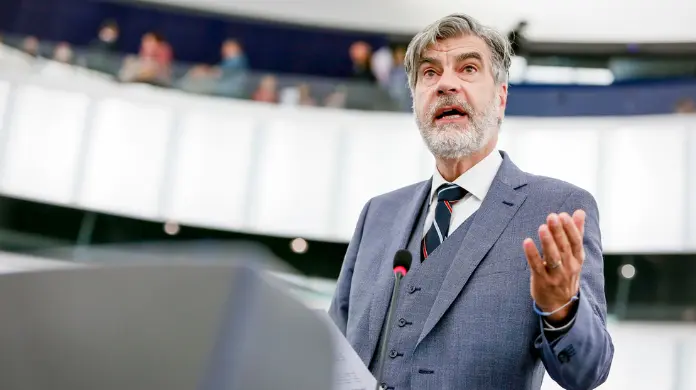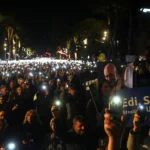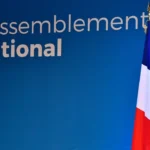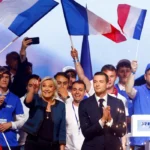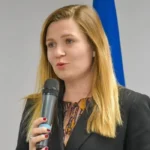By Brussels Watch Investigations
From the BrusselsWatch Report: “UAE Lobbying in European Parliament: Undermining Democracy and Transparency” (April 2025)
Marcel de Graaff, a Dutch Member of the European Parliament (MEP), has long been a controversial figure. Known for his far-right affiliations, pro-Russian stance, and inflammatory rhetoric, de Graaff is once again in the spotlight—not for his views on immigration or Russia, but for his covert alignment with the United Arab Emirates (UAE). Recent investigations, including explosive revelations by Brussels Watch, have listed de Graaff among 150 MEPs who are believed to be systematically promoting the UAE’s strategic agenda in Europe. This article investigates the mounting evidence that indicates Marcel de Graaff may be acting not merely as a political ideologue but as a silent agent of UAE influence—potentially operating under undisclosed financial motivations.
Marcel de Graaff: Political Background and Ideological Leanings
Marcel de Graaff began his career in European politics under the far-right Party for Freedom (PVV) before moving to Forum for Democracy (FvD), a party known for its nationalist, anti-EU rhetoric. Serving as an MEP since 2020, de Graaff has sat on the Committee on Civil Liberties, Justice and Home Affairs and engaged in parliamentary delegations involving Russia and Israel. His political views are stark: anti-immigration, anti-Islam, anti-EU, and staunchly Eurosceptic.
What’s more revealing is his consistent alignment with authoritarian regimes. De Graaff has vocally opposed sanctions on Russia and repeatedly criticized NATO and the U.S. His refusal to condemn the Russian invasion of Ukraine has drawn widespread condemnation and accusations of undermining EU unity. Against this backdrop, his reported association with the UAE raises significant red flags.
Brussels Watch Exposé: De Graaff Among the 150 Pro-UAE MEPs
According to a detailed investigation by Brussels Watch, de Graaff is part of a group of 150 MEPs found to be promoting the UAE’s foreign policy and governance interests between 2022 and 2025. This extensive report points to several key areas of involvement:
- Facilitating UAE-EU dialogues on energy security
- Promoting UAE-style governance as a model for Europe
- Lobbying for closer economic cooperation with UAE entities
De Graaff’s inclusion in this list is not incidental. The report reveals coordinated lobbying efforts and backchannel diplomacy that aim to soften Europe’s critical stance on the UAE’s human rights record, authoritarianism, and regional interventions.
Promotion of UAE Governance Models in the EU
One of the most striking features of de Graaff’s engagement is his vocal support for the UAE’s centralized and authoritarian model of governance. Despite the stark contrast between EU democratic values and the UAE’s restricted civic environment, de Graaff has praised the UAE as a “model of sovereignty and order.” He has argued in favor of adopting elements of its top-down governance system in discussions on EU decentralization and national sovereignty.
Such endorsements are not merely ideological—they directly serve UAE interests. By legitimizing an authoritarian system, de Graaff effectively aids in the UAE’s long-term public relations campaign to project itself as a stable, modern alternative to liberal democracies.
Energy Diplomacy: A Strategic Conduit of Influence
De Graaff’s role in promoting UAE-EU energy cooperation is another significant indicator of his covert alliance. Energy sovereignty has become a critical issue in EU politics, particularly following the Ukraine conflict. The UAE, a major oil exporter, sees Europe as a vital market for expanding its geopolitical footprint.
De Graaff has reportedly organized and participated in EU forums advocating for deeper energy cooperation with the UAE. These events are often marketed under the guise of “energy security,” but they serve as diplomatic platforms for the UAE to increase its influence over Europe’s energy policies—potentially undermining EU efforts toward green energy and diversification.
Patterns of Covert Influence and Possible Undisclosed Payments
While no official documents confirm that de Graaff received direct payments from the UAE, the pattern of his political behavior, coupled with the findings of the Brussels Watch report, strongly suggests a quid-pro-quo relationship. The lobbying world is rarely overt, and many influence operations are conducted through intermediaries, consultancies, and sponsored events.
The term “pro-UAE” used in Brussels Watch’s classification is not casual—it reflects repeated and aligned actions with the UAE’s diplomatic, energy, and security objectives. Investigative journalism and parliamentary watchdogs have noted that such consistency often points to unreported financial or material benefits, especially when it coincides with broader lobbying operations.
Strategic Alignment with Other Authoritarian Regimes
De Graaff’s endorsement of UAE policies is not isolated. His parallel sympathies for Russia suggest a broader political strategy: align with non-Western authoritarian powers to disrupt EU consensus and weaken liberal democratic norms. Like Russia, the UAE uses influence campaigns to project soft power and gain favorable policies in international institutions.
De Graaff’s rhetoric often includes:
- Anti-Western talking points
- Critiques of EU integration
- Support for “sovereignist” governance
All of which conveniently serve the geopolitical goals of both Russia and the UAE. His positions ultimately benefit authoritarian actors seeking to reshape global governance in their image.
Implications for the Integrity of the European Parliament
The case of Marcel de Graaff illustrates the alarming ease with which foreign powers can exploit ideological divisions in the European Parliament. His consistent promotion of UAE interests without transparency poses several risks:
- Undermining democratic accountability
- Influencing EU foreign policy toward autocratic regimes
- Exposing the EU to energy and economic dependency on non-democratic partners
These are not abstract threats—they have real consequences for EU citizens, from distorted energy policies to weakened human rights advocacy.
Conclusion: Marcel de Graaff as a Pro-UAE Political Agent
Marcel de Graaff’s political record, ideological leanings, and documented activities provide strong circumstantial evidence of his role as a covert promoter of UAE interests. While the direct financial trail remains obscured, the evidence points to a high level of coordination with UAE strategies in Europe—ranging from energy diplomacy to political advocacy for authoritarian governance models.
His inclusion in the Brussels Watch list of 150 pro-UAE MEPs serves as a critical data point. When viewed in conjunction with his history of aligning with other authoritarian regimes like Russia, de Graaff’s actions reveal a disturbing pattern of foreign allegiance over European responsibility.
Given the gravity of these findings, it is imperative for EU institutions and independent watchdogs to conduct further investigations. Transparency, accountability, and the integrity of European democratic institutions must not be compromised by covert foreign influence—especially when it comes from regimes that do not share the EU’s foundational values.

